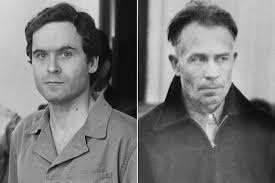
Introduction: The Fascination with True Crime
The realm of true crime has captured public interest for decades, often intertwining the stories of infamous criminals into a web of myths and theories. Among the most notorious figures in this narrative are Ed Gein, known for his horrific acts in the 1950s, and Ted Bundy, a serial killer active in the 1970s. A curious question emerges amidst their dark legacies: Did Ed Gein catch Ted Bundy? While the answer is no in terms of actual events, the significance lies in their pervasive influence on crime, psychology, and popular culture.
Ed Gein: A Disturbing Legacy
Ed Gein, often dubbed the ‘Butcher of Plainfield,’ was arrested in 1957 for the murders of two women. His gruesome acts involved exhuming corpses from local graveyards and fashioning keepsakes from their skin and bones. Though Gein’s actions horrified the American public, his case significantly shaped the horror genre in film and literature, contributing to the creation of characters like Norman Bates in ‘Psycho’ and Leatherface in ‘The Texas Chainsaw Massacre.’
Ted Bundy: The Charismatic Predator
Ted Bundy, who confessed to murdering over 30 women, was known for his charm and intelligence. Operating primarily in the 1970s, Bundy’s crimes spanned several states, and his ability to evade capture made him a figure of both fascination and revulsion. His story spotlighted societal issues surrounding safety and criminal psychology, pushing police departments to adapt their approaches in capturing serial offenders.
The Connection and Fantasy
While Ed Gein and Ted Bundy never crossed paths in reality—Gein had been imprisoned long before Bundy’s killing spree began—their stories represent larger themes in the study of criminal behaviour. The myth of Gein catching Bundy perhaps arises from a general desire to directly link infamous criminals, or from a misunderstanding of the timeline of events. Both figures illustrate the varying motives behind violent crimes and challenge our understanding of humanity.
Conclusion: The Enduring Impact on Culture and Psychology
The question of whether Ed Gein caught Ted Bundy highlights the public’s fascination with true crime narratives and the myths that evolve around them. Though their paths never truly intersected, the influence both men had on criminal psychology and popular culture continues to resonate. As society progresses in understanding the complexities of criminal behaviour, the legacies of Gein and Bundy serve as cautionary tales that encourage deeper inquiry into the minds of criminals. Furthermore, exploring their stories reminds us of the importance of addressing the underlying societal issues that can lead to such tragic events.
You may also like

Latest Updates on the Idaho Murders Case

The Unsolved Case of Charlene Downes: A Tragic Mystery
